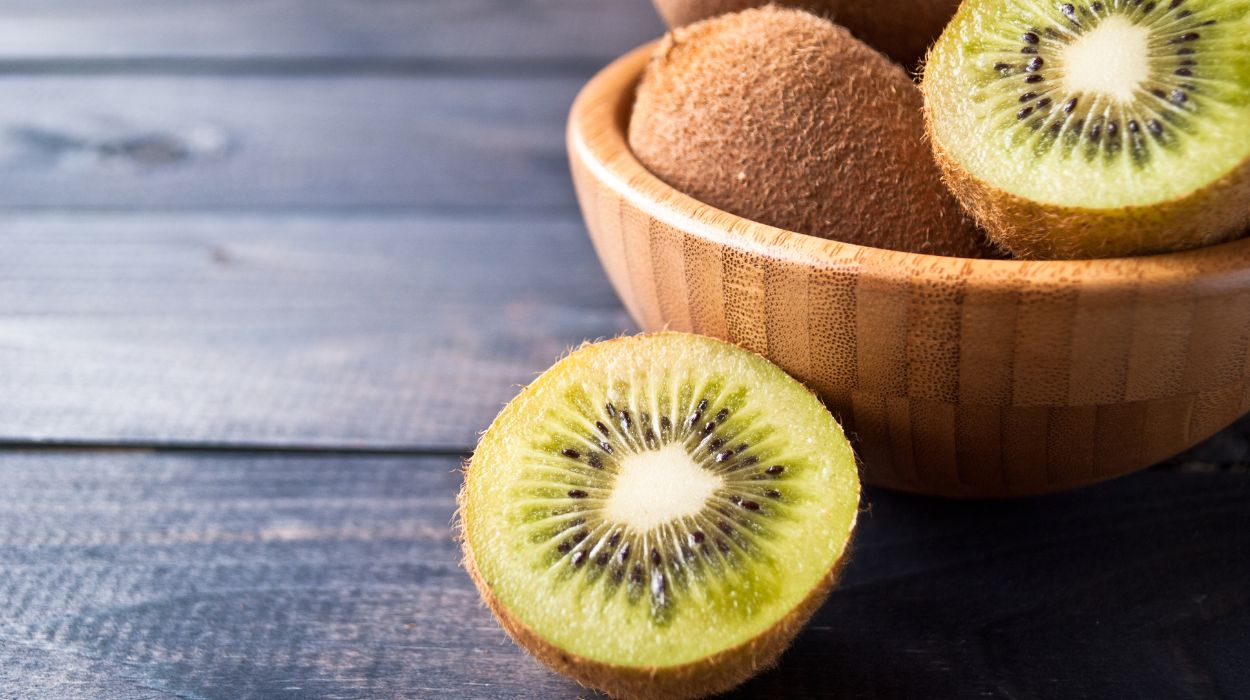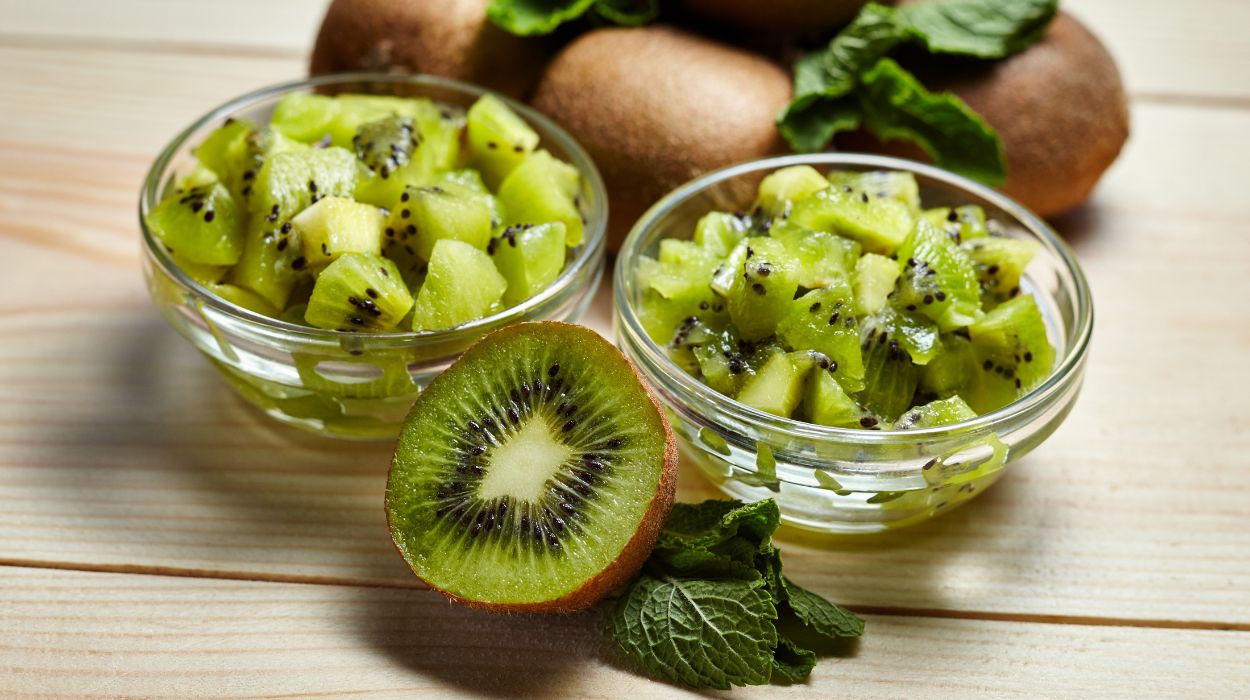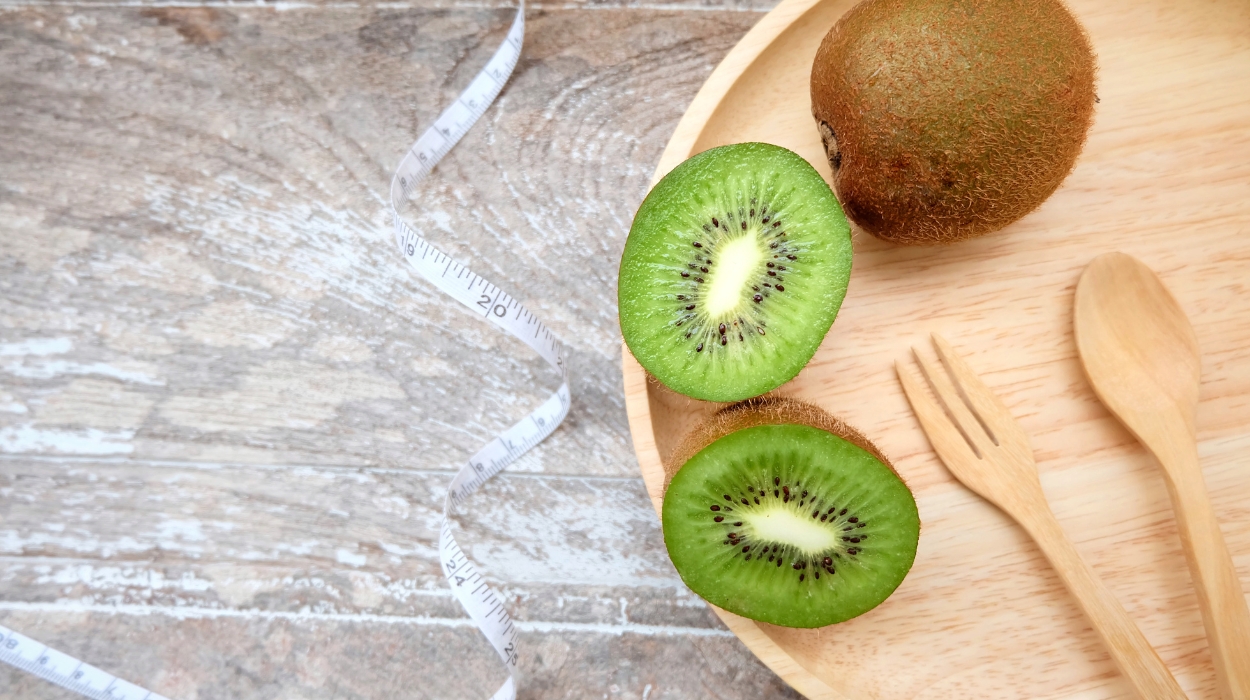Kiwi, also known as the Chinese gooseberry,[1] is a delicious fruit that has gained popularity for its unique flavor and many health benefits. Originating from China, kiwi is now enjoyed worldwide in healthy dishes to support weight loss and immune function.
But is kiwi good for weight loss? If you want to get healthy and are looking for the best fruits for weight loss, kiwi might just be the perfect choice of fruit that can aid your efforts. Packed with essential nutrients, low in calories, and abundant in dietary fiber, kiwi offers a range of benefits that can support your weight loss goals.
In this article, we will explore the connection between kiwi and weight loss, delve into its nutritional profile, uncover its key benefits, and provide practical tips on incorporating kiwi into your balanced diet plan.
Are Kiwis Good For Losing Weight?
Yes, kiwis are a great addition to a weight loss diet. They’re low in calories but packed with nutrients like fiber, vitamins, and antioxidants.
The fiber content can help with satiety, keeping you feeling full for longer and potentially reducing calorie intake. However, remember that weight loss is about overall diet and lifestyle.
So, incorporating kiwis into a balanced, calorie-controlled diet alongside exercise will yield the best results.
Is Kiwi Fruit Good For Weight Loss?

What classifies a fruit as good for weight loss? Weight loss requires that you cut down calories while still getting your complete nutrient requirements. This may involve a low-fat diet and fruit and vegetable supplements to boost your nutritional intake.
Kiwi is a powerhouse packed with beneficial nutrients and low in calories. So, yes, it is good for weight loss.
Here is the full nutrient breakdown for one kiwi fruit (75 grams) as calculated by USDA:[2]
- Water – 62 grams.
- Calories – 43.5 Kilocalories.
- Carbohydrates – 10.5 grams.
- Protein – 1.06 grams.
- Fats – 0.33 grams.
- Fiber – 2.25 grams.
- Calcium – 26.2 grams.
- Iron – 0.18 grams.
- Vitamin C – 56 milligrams.
- Potassium – 148 milligrams.
- Vitamin E – 1.3 milligrams.
In addition to macronutrients like carbohydrates, proteins, and fats, kiwis are brimming with essential micronutrients and antioxidants. They are an excellent source of vitamin C, providing more than twice the daily recommended intake in just one fruit.
Vitamin C is an antioxidant that supports a healthy immune system,[3] and research[4] shows it also has fat-burning properties. Kiwis also contain vitamin K, vitamin E, potassium, and iron. Moreover, they are rich in antioxidants,[5] which help protect against damage from harmful free radicals that come from exposure to the sun and other toxic substances.
Overall, kiwi is good if you want to lose weight. Now, let’s dive into the specific kiwi fruit benefits for weight loss.
Kiwi Fruit Benefits For Weight Loss

Kiwi fruit offers several benefits that can support weight loss. Here are some yellow kiwi benefits:
Low In Calories
A medium-sized kiwi typically contains around 60 calories[2] making it a fantastic option for a low-calorie snack. To help you lose weight, you need to create a calorie deficit by consuming fewer calories than burning. So, you can have kiwis if you’re watching your calorie intake.
Despite being low in calories, kiwis are packed with nutrients, making them a nutrient-dense choice for those looking to maintain a balanced diet.
High In Fiber
The high fiber content is linked to the weight loss effects of kiwi consumption. Kiwi fruits are rich in soluble and insoluble dietary fibers, making them an excellent addition[6] to a healthy weight loss diet.
The high fiber content aids digestion by promoting regular bowel movements and preventing constipation, ultimately contributing to gut health and efficient absorption of nutrients. Furthermore, the presence of dietary fiber in kiwi fruit helps create a feeling of fullness[7] and satiety, curbing unnecessary snacking and overeating. This can lead to reduced calorie intake, which is crucial for achieving weight loss goals.
Rich In Nutrients
Despite being low in calories, kiwis are packed with essential nutrients like vitamins C, K, E, potassium, and folate. The combination of these nutrients[8] in kiwis not only supports immune function but also aids in regulating metabolism and blood sugar levels.
This nutrient profile makes kiwis an excellent addition to a balanced diet, especially for those on a weight loss journey, as they offer valuable nutrients without contributing significantly to calorie intake.
Increased Metabolism
Another kiwi weight loss benefit revolves around their ability to boost metabolism. Kiwis are rich in antioxidants[9] like polyphenols, which counteract harmful free radicals in our bodies and aid in improving overall health.
These antioxidants also stimulate the body’s metabolic rate by improving digestion and absorption of nutrients, leading to increased energy expenditure. For example, research shows that kiwifruit’s total antioxidant capacity was higher than apples, grapefruits, and pears.
Benefits Metabolic Health
The abundance of potassium in kiwis helps regulate blood pressure levels and maintains proper heart function. A study showed that a kiwi a day was associated with lower systolic and diastolic blood pressure[10] compared to an apple a day. This means kiwis help lower blood pressure and reduce the risk of hypertension and other cardiovascular conditions than other well-known fruits.
Kiwi also helps improve blood sugar aiding in the prevention of diabetes. A study showed that when a third of the carbohydrate content in breakfast cereal is replaced with kiwifruit, blood glucose levels are more consistently maintained.
Best Ways To Add Kiwi Fruit To Your Meals
Kiwi fruit is a versatile and tasty addition to various dishes. Here are some creative ways to incorporate kiwi into your superfoods for weight loss:
Fruit Salad
You can add sliced kiwi to a fruit salad for a tangy and refreshing twist. It pairs well with other fruits like strawberries, mangoes, and pineapple. Here is a simple recipe for a fruit salad:
FRUIT SALAD WITH KIWI
Ingredients:
- 2 kiwi fruits, peeled and sliced.
- 1 cup strawberries, hulled and sliced.
- 1 cup cubed mango.
- 1 cup cubed pineapple.
Instructions:
- Prepare all the fruits by slicing and cubing them as necessary.
- Combine the sliced kiwi, strawberries, mango, pineapple, and any other chosen fruits in a large bowl.
- Gently toss the fruits together until they are evenly distributed.
- Serve immediately.
Smoothies
You can also mix kiwi with other fruits like bananas, spinach, or berries to create flavorful and nutritious smoothies. Your smoothie can also include greens powders, greek yogurt, and more for more benefits. Here is a recipe:
KIWI SMOOTHIE
Ingredients:
- 2 ripe kiwi fruits, peeled and sliced.
- 1 ripe banana.
- 1 cup fresh spinach leaves.
- 1/2 cup berries (such as strawberries, blueberries, or raspberries).
- 1 cup yogurt or almond milk.
- Honey or maple syrup.
Instructions:
- Place the sliced kiwi, banana, spinach, berries, and yogurt/almond milk in a blender.
- Blend on high speed until smooth and creamy.
- Taste the smoothie and add honey or maple syrup if additional sweetness is desired.
- Pour into glasses and serve immediately.
Salsa
Another great option is to make a kiwi salsa by combining diced kiwi with tomatoes, onions, cilantro, lime juice, and a hint of jalapeño. This goes wonderfully with grilled fish or chicken. Here’s a recipe:
KIWI SALSA
Ingredients:
- 2 kiwi fruits, peeled and diced.
- 2 ripe tomatoes, diced.
- 1/4 cup finely chopped red onion.
- 1/4 cup chopped fresh cilantro.
- 1 small jalapeño pepper, seeded and finely chopped.
- Juice of 1 lime.
- Salt and pepper to taste.
Instructions:
- In a mixing bowl, combine the diced kiwi, tomatoes, red onion, cilantro, and jalapeño.
- Squeeze lime juice over the mixture and gently toss to combine.
- Season with salt and pepper according to taste preferences.
- Allow the flavors to meld by refrigerating the salsa for at least 30 minutes before serving.
- Serve chilled alongside grilled fish, chicken, or tortilla chips as a dip.
How Many Kiwis Can You Eat A Day?
The number of kiwis you can eat daily depends on factors like diet, individual tolerance, and specific health conditions. Generally, kiwis are nutritious and low in calories, making them a healthy addition to your diet.
Most people can safely consume one to two kiwis daily without issues. However, some people may experience mild allergic reactions to kiwi.[11] In such cases, monitoring your body’s response and consulting a healthcare professional if you have concerns is essential.
Who Should Avoid Eating Kiwi?
While kiwi is a nutritious fruit with various health benefits, there are specific groups of people who might need to avoid or limit their consumption due to potential health concerns:
- People who are allergic: Some individuals may have allergies to kiwi. Allergic reactions[11] to kiwi can range from mild symptoms like itchiness and swelling of the lips, mouth, or throat to severe reactions like difficulty breathing or anaphylaxis. People allergic to other fruits like bananas, avocados, or latex may also have a higher risk of being allergic to kiwi.
- People on blood thinning medication: Kiwi contains vitamin K, which plays a role in blood clotting.[12] People taking blood-thinning medications like warfarin need to maintain a consistent intake of vitamin K. While kiwi is not excessively high in vitamin K, it’s advisable to consult a healthcare professional about its consumption if you’re on such medication.
- Infants and young children: Whole kiwi fruit can be a choking hazard for infants and young children. It’s better to offer kiwi in a mashed or pureed form for babies who have started eating solid foods.
Conclusion
In conclusion, kiwi fruit stands out as a nutritious option for those aiming for weight management. Its low-calorie count, high fiber content, and rich nutrient profile make it a valuable addition to a balanced diet.
However, it is important to seek counsel from your healthcare provider before starting any weight loss regimen or making changes to your diet. They will advise you on the best way to incorporate kiwi into your weight loss journey.
Frequently Asked Questions
Kiwis are moderately high in sugar compared to some other fruits. While they contain natural sugars, their fiber content helps regulate blood sugar levels.
Kiwi is a nutritious fruit but won’t target belly fat alone. Its low-calorie and high-fiber content can aid in weight management as part of a balanced diet and exercise routine.
Consuming kiwi daily in moderation is generally healthy due to its rich vitamin C, antioxidants, and fiber. However, variety is key for a balanced diet.
Fruits that are low in fiber and promote fullness are great choices for weight loss due to these properties.
 Evidence Based
Evidence Based
